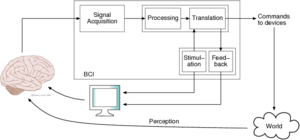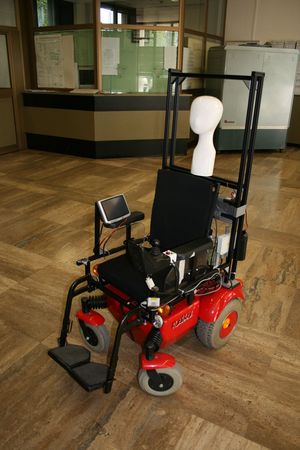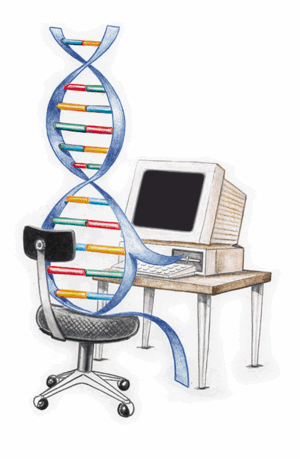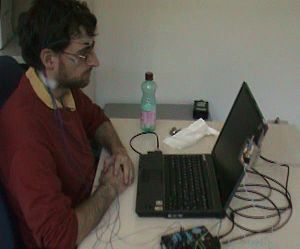Difference between revisions of "Brain-Computer Interface"
(→Ongoing projects) |
m (→Project proposals) |
||
| (10 intermediate revisions by 3 users not shown) | |||
| Line 1: | Line 1: | ||
| + | [[Category:Research Topic]] | ||
| + | This research topic belongs to the research area [[belongsToArea::BioSignal Analysis]]. | ||
| + | |||
A Brain-Computer Interface (BCI) is an experimental communication system that allows an individual to control a device by using signals from the brain (e.g., electroencephalography -- EEG). | A Brain-Computer Interface (BCI) is an experimental communication system that allows an individual to control a device by using signals from the brain (e.g., electroencephalography -- EEG). | ||
| − | + | Click [http://airlab.elet.polimi.it/index.php/airlab/research_areas/affective_computing here] for a brief description of the Research Area, taken from the AirLab website. | |
| − | + | ==Ongoing Projects== | |
| − | + | Projects on this topic: | |
| − | + | {{#ask: [[Category:Project]][[prjResTopic::{{PAGENAME}}]][[PrjEnd::>{{CURRENTYEAR}}/{{CURRENTMONTH}}/{{CURRENTDAY}}]] |format=ul}} | |
| − | + | ||
| − | + | ||
| − | + | ||
| − | + | ||
| − | + | ||
| − | + | ||
| − | == | + | == Project proposals == |
| − | + | ||
| − | + | ||
| − | + | ||
| − | + | ||
| − | + | ||
| − | == | + | {{#ask: [[Category:ProjectProposal]] |
| + | [[PrjResTopic::{{PAGENAME}}]]| | ||
| + | ?PrjTitle | | ||
| + | ?PrjImage | | ||
| + | ?PrjDescription | | ||
| + | ?PrjTutor | | ||
| + | ?PrjStarts | | ||
| + | ?PrjStudMin | | ||
| + | ?PrjStudMax | | ||
| + | ?PrjCFUMin | | ||
| + | ?PrjCFUMax | | ||
| + | ?PrjResArea | | ||
| + | ?PrjResTopic | | ||
| + | ?PrjLevel | | ||
| + | ?PrjType | | ||
| + | format = template | | ||
| + | template = Template:ProjectProposalViz | ||
| + | }} | ||
| + | ==Finished Projects== | ||
| + | |||
| + | {{#ask: [[Category:Project]][[prjResTopic::{{PAGENAME}}]] [[PrjEnd::<{{CURRENTYEAR}}/{{CURRENTMONTH}}/{{CURRENTDAY}}]]|format=ul}} | ||
| + | |||
| + | * [[A genetic algorithm for automatic feature extraction from EEG data]] | ||
| + | * [[Graphical user interface for an autonomous wheelchair]] | ||
| + | * [[Online automatic tuning of the number of repetitions in a P300-based BCI]]* [[Predictive BCI Speller based on Motor Imagery]] (Master thesis, Tiziano D'Albis) | ||
| + | * [[Feature Selection and Extraction for a BCI based on motor imagery]] (Master thesis, Francesco Amenta) | ||
| + | * [[Integrating Motor Imagery and Error Potentials in a Brain-Computer Interface]] (Master Thesis, Paolo Calloni) | ||
| + | * [[Ocular Artifacts Filter implementation for a BCI based on motor imagery]] (First Level thesis, Fabio Beltramini) | ||
| + | * [[Reproduction of an algorithm for the recognition of error potentials]] | ||
* [[Online P300 and ErrP recognition with BCI2000]] (Master thesis, Andrea Sgarlata). | * [[Online P300 and ErrP recognition with BCI2000]] (Master thesis, Andrea Sgarlata). | ||
* Tesi di Carlo Gimondi e Luisella Messana | * Tesi di Carlo Gimondi e Luisella Messana | ||
| Line 29: | Line 49: | ||
* Tesi di Francesco Cartella | * Tesi di Francesco Cartella | ||
| − | == | + | == Equipment == |
* [[Electroencephalographs]] | * [[Electroencephalographs]] | ||
| Line 40: | Line 60: | ||
== Publications == | == Publications == | ||
| − | You can find publications in the BCI field by | + | You can find other publications in the BCI field by AIRLab members involved in this topic (see above) on their home pages. |
| − | + | ||
| + | === Journals === | ||
| + | B. Dal Seno, L. Mainardi, and M. Matteucci. [http://ieeexplore.ieee.org/xpl/freeabs_all.jsp?arnumber=5256301 The Utility metric: A novel method to assess the overall performance of discrete brain-computer interfaces]. ''IEEE Transactions on Neural Systems and Rehabilitation Engineering'', pages 20-28, February 2010. | ||
| + | |||
| + | B. Dal Seno, M. Matteucci, and L. Mainardi. [http://www.hindawi.com/journals/cin/2010/307254.html On-line detection of P300 and error potentials in a BCI speller]. ''Computational Intelligence and Neuroscience, Special Issue on Processing of Brain Signals by Using Hemodynamic and Neuroelectromagnetic Modalities'', Article ID 307254, 5 pages, 2010. | ||
| + | |||
| + | === PhD Theses === | ||
| + | |||
| + | B. Dal Seno. [[media:B_DalSeno_PhdThesis2009.pdf | Toward An Integrated P300- And ErrP-Based Brain-Computer Interface]]. Ph.D. dissertation, Politecnico di Milano, 2009. | ||
== Media == | == Media == | ||
Latest revision as of 18:26, 1 November 2010
This research topic belongs to the research area BioSignal Analysis.
A Brain-Computer Interface (BCI) is an experimental communication system that allows an individual to control a device by using signals from the brain (e.g., electroencephalography -- EEG).
Click here for a brief description of the Research Area, taken from the AirLab website.
Contents
Ongoing Projects
Projects on this topic:
Project proposals
| Wiki Page: | Aperiodic visual stimulation in a VEP-based BCI | |
| Title: | Aperiodic visual stimulation in a VEP-based BCI | |
| Description: | Visual-evoked potentials (VEPs) are a possible way to drive the a Brain-Computer Interface (BCI). This projects aims at maximizing the discrimination between different stimuli by using numerical codes derived from techniques of digital telecommunications.
| |
| Tutor: | [[MatteoMatteucci | ]] (, , , , , , , , , , , , , , , , , , … further resultswarning.png
| |
| Start: | 1 October 2009 | |
| Students: | 1 | |
| CFU: | 5 | |
| Research Area: | BioSignal Analysis | |
| Research Topic: | Brain-Computer Interface | |
| Level: | Bachelor of Science | |
| Type: | Course, Thesis |
| Wiki Page: | Creation of new EEG training by introduction of noise | |
| Title: | Creation of new EEG training by introduction of noise | |
| Description: | A Brain-Computer Interface (BCI) must be trained on the individual user in order to be effective. This training phase require recording data in long sessions, which is time consuming and boring for the user. The aim of this project is to develop algorithm to create new training EEG (electroencephalography) data from existing ones, so as to speed up the training phase.
| |
| Tutor: | [[MatteoMatteucci | ]] (, , , , , , , , , , , , , , , , , , … further resultswarning.png
| |
| Start: | 1 October 2009 | |
| Students: | 1 - 2 | |
| CFU: | 5 - 20 | |
| Research Area: | BioSignal Analysis | |
| Research Topic: | Brain-Computer Interface | |
| Level: | Bachelor of Science, Master of Science | |
| Type: | Course, Thesis |
| Wiki Page: | Driving an autonomous wheelchair with a P300-based BCI | |
| Title: | Driving an autonomous wheelchair with a P300-based BCI | |
| Description: | This project pulls together different Airlab projects with the aim to drive an autonomous wheelchair (LURCH) with a BCI, through the development of key software modules. Depending on the effort the student is willing to put into it, the project can grow to a full experimental thesis. | |
| Tutor: | [[MatteoMatteucci | ]] (, , , , , , , , , , , , , , , , , , … further resultswarning.png
| |
| Start: | 1 November 2008 | |
| Students: | 1 | |
| CFU: | 5 - 20 | |
| Research Area: | BioSignal Analysis | |
| Research Topic: | Brain-Computer Interface | |
| Level: | Bachelor of Science, Master of Science | |
| Type: | Course |
| Wiki Page: | Exploratory data analysis by genetic feature extraction | |
| Title: | Exploratory data analysis by genetic feature extraction | |
| Description: | Understanding the waves in EEG signals is an hard task and psicologists often need automatic tools to perform this task. In this project we are interested in using a genetic algorithm developed for P300 feature extraction in order to extract useful informations from Error Potentials. The project is a collaboration with the psicology department od Padua University.
| |
| Tutor: | [[MatteoMatteucci | ]] (, , , , , , , , , , , , , , , , , , … further resultswarning.png
| |
| Start: | 1 October 2009 | |
| Students: | 1 - 2 | |
| CFU: | 5 - 20 | |
| Research Area: | BioSignal Analysis | |
| Research Topic: | Brain-Computer Interface | |
| Level: | Master of Science | |
| Type: | Course, Thesis |
| Wiki Page: | Multimodal GUI for driving an autonomous wheelchair | |
| Title: | Multimodal GUI for driving an autonomous wheelchair | |
| Description: | This project pulls together different Airlab projects with the aim to drive an autonomous wheelchair (LURCH - The autonomous wheelchair) with a multi modal interface (Speech Recognition, Brain-Computer Interface, etc.), through the development of key software modules. The work will be validated with live experiments.
| |
| Tutor: | [[MatteoMatteucci | ]] (, , , , , , , , , , , , , , , , , , … further resultswarning.png
| |
| Start: | 1 October 2009 | |
| Students: | 1 - 2 | |
| CFU: | 5 - 10 | |
| Research Area: | BioSignal Analysis | |
| Research Topic: | Brain-Computer Interface | |
| Level: | Bachelor of Science, Master of Science | |
| Type: | Course |
| Wiki Page: | Real-time removal of ocular artifact from EEG | |
| Title: | Real-time removal of ocular artifact from EEG | |
| Description: | In a Brain-Computer Interface (BCI) based on electroencephalogram (EEG), one of the most important sources of noise is related to ocular movements. Algorithms have been devised to cancel the effect of such artifacts. The project consists in the in the implementation in real time of an existing algorithm (or one newly developed) in order to improve the performance of a BCI.
| |
| Tutor: | [[MatteoMatteucci | ]] (, , , , , , , , , , , , , , , , , , … further resultswarning.png
| |
| Start: | 1 October 2009 | |
| Students: | 1 - 2 | |
| CFU: | 2.5 - 5 | |
| Research Area: | BioSignal Analysis | |
| Research Topic: | Brain-Computer Interface | |
| Level: | Bachelor of Science, Master of Science | |
| Type: | Course |
Finished Projects
- Characterization of the NIA signal
- Stimulus tagging using aperiodic visual stimulation in a VEP-based BCI
- A genetic algorithm for automatic feature extraction from EEG data
- Graphical user interface for an autonomous wheelchair
- Online automatic tuning of the number of repetitions in a P300-based BCI* Predictive BCI Speller based on Motor Imagery (Master thesis, Tiziano D'Albis)
- Feature Selection and Extraction for a BCI based on motor imagery (Master thesis, Francesco Amenta)
- Integrating Motor Imagery and Error Potentials in a Brain-Computer Interface (Master Thesis, Paolo Calloni)
- Ocular Artifacts Filter implementation for a BCI based on motor imagery (First Level thesis, Fabio Beltramini)
- Reproduction of an algorithm for the recognition of error potentials
- Online P300 and ErrP recognition with BCI2000 (Master thesis, Andrea Sgarlata).
- Tesi di Carlo Gimondi e Luisella Messana
- Tesi di Gianmaria Visconti
- Tesi di Francesco Cartella
Equipment
How to
Publications
You can find other publications in the BCI field by AIRLab members involved in this topic (see above) on their home pages.
Journals
B. Dal Seno, L. Mainardi, and M. Matteucci. The Utility metric: A novel method to assess the overall performance of discrete brain-computer interfaces. IEEE Transactions on Neural Systems and Rehabilitation Engineering, pages 20-28, February 2010.
B. Dal Seno, M. Matteucci, and L. Mainardi. On-line detection of P300 and error potentials in a BCI speller. Computational Intelligence and Neuroscience, Special Issue on Processing of Brain Signals by Using Hemodynamic and Neuroelectromagnetic Modalities, Article ID 307254, 5 pages, 2010.
PhD Theses
B. Dal Seno. Toward An Integrated P300- And ErrP-Based Brain-Computer Interface. Ph.D. dissertation, Politecnico di Milano, 2009.
Media
- 22 Jan 2009: Repubblica TV report on Lurch and BCI (in Italian)
- Aug 2008: RAI TGLeonardo report on Airlab research (in Italian). The video is a fragment of a longer report on mind and intelligence.



